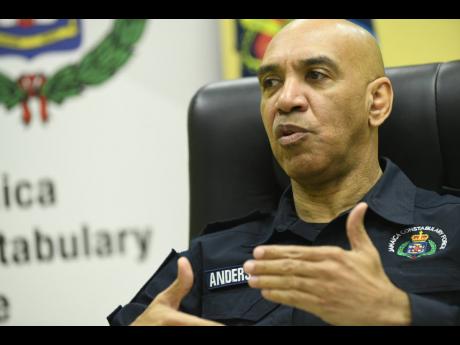Anderson says no plans to quit as commish
Police Commissioner Antony Anderson has put an end to months-long speculation that he would be stepping away from the post before his contract ends next March.
“Yes,” the major general said when asked last Thursday if he will be serving out his three-year contract. “I haven’t had any such conversation with anyone. I don’t know how anybody could have that discussion.”
The Police Service Commission (PSC) appointed the former army chief on March 19, 2018, ending his stint as national security adviser.
But for weeks, speculation has been rife that Anderson intends to leave the post early.
“At this juncture, the Police Service Commission has not decided on the next steps,” the Office of the Services Commissions (OSC), administrator for the Professor Gordon Shirley-chaired PSC, said in a statement to The Gleaner on October 21.
Subsequent queries seeking clarification yielded little as the OSC said it was “unable to provide any further assistance to you regarding your query as to whether the commissioner of police has given an indication that he will be stepping down”.
Police chiefs do not typically stay in the role for very long, especially since 1962, where the average length of time for the 15 commissioners has been three to four years.
The longest-serving commissioner of the last two decades was Francis Forbes, who served for nine years up to 2005. Most have resigned or retired early in the face of public pressure on their political bosses.
Owen Ellington survived for four years before suddenly retiring.
Anderson, in whom Prime Minister Andrew Holness has reposed significant confidence, and the Jamaica Defence Force (JDF) head, Lt Gen Rocky Meade, have been steering the country’s anti-crime efforts.
Meade took over as JDF head after Anderson stepped down in 2016 to take up the newly created post of national security adviser, which has not been filled since he left for the top cop job in 2018.
“It’s not a mistake why we returned to army figures to lead the JCF. He (Holness) needs people he could trust and we know crime was going to be critical to the next elections,” said a very senior administration official.
The last army leader-turned-police-commissioner was Rear Admiral Hardley Lewin, who resigned after two years.
Good financial relationship
The Anderson-Holness-Meade “special relationship”, as the government source labelled it, has been good financially for the two main security forces.
By March next year, more than $61 billion would have been spent on national security since 2016, four times the $14.7 billion spent for the previous five-year period led mostly by a People’s National Party administration, Holness argued in Parliament earlier this year as the coronavirus pandemic was setting in.
A key plank of Anderson’s tenure so far has been the more nimble and modernised public communication of the Jamaica Constabulary Force and critically, the widespread use of states of emergency as part of the crime plan.
That plan has been upended after the Supreme Court ruled in September that sections of the enabling law were unconstitutional, a decision the Holness administration has committed to appealing but has given no indication on that score so far.
This year, homicides have fallen by 1.3 per cent for the period January 1 to November 28, compared with the similar period for 2019.
That has masked increases of more than 20 per cent in five police divisions – St Ann, Kingston Western, Kingston Central, St Catherine North and St Mary.
The commissioner may also note a focus on placing gangs before the court, and in some instances, securing major convictions highlighted last week with the 26-year imprisonment of gang leader Uchence Wilson.
The commissioner has a “difficult job”, asserted Howard Mitchell, the former president of the Private Sector Organisation of Jamaica, who lamented the slow pace of reform in the 11,000-member police force.
“I think the commissioner is well-meaning and well-intentioned. I think the politics of the force is frustrating him, added to the fact that the reform of the judicial system and investigative capacities of the force are not aligned,” he told The Gleaner.

